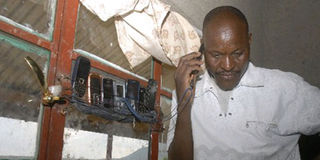Window that links remote village to rest of the world

Plesian Boarding and Day Primary schools head teacher Mr Lucas Topero using a phone at the staff room. Photo/Suleiman Mbatiah
What you need to know:
- Teachers and local pastoralists have only one tiny position from which their phones can access mobile network
One window at the staff room of a primary school in Baringo County occupies a very special place in the hearts of the locals.
It has a makeshift stand, crudely made of wire and pieces of a blanket, on which all manner of mobile phones are placed.
Reason? It is the only place where the Safaricom mobile phone network is accessible in the locality.
Teachers, parents and other locals often congregate on the main window of the staff room of Plesian Primary School in East Pokot District every time they want to make or receive a call.
It gets particularly tricky if the phone call is confidential. The concerned teacher usually has to plead with everyone else to vacate the staff room.
The phone support is elevated at about three metres from the ground, which means sometimes a caller has to shout while making conversation.
A stool is available for those who are not tall enough.
Being the only point with a mobile signal in the locality means all kinds of people, including ordinary villagers who are pastoralists, will be found queuing up outside the staff room, waiting to communicate with the world outside their inaccessible district.
“When making a confidential call, I do not allow other teachers to stay in the staff room,” the school head, Lukas Topora, says.
This is mostly when reporting on office matters to the district education officer in Chemolingot, the district headquarters, or when fellow teachers and other villagers want to share personal matters with their relatives and friends in other parts of the country.
The poor network often catches up with dignitaries visiting the locality. The area MP, Asman Kamama, and the District Commissioner usually use the staff room window to make calls when chairing or attending meetings in the area around the school, says Mr Topora.
NGO officials with projects in the area also use the same staff room for their telephone communication.
Plesian Primary School is located in Amaiya Division, on the boundary of East Pokot and Samburu Central districts.
It is one of the remotest parts of the country, where mobile phone service providers have completely ignored.
Other divisions within East Pokot are no better off for the mobile phone signal.
In Churo, Tangulbue, Nginyang, Mondi and Koloa, people usually climb trees or hills to get network access. It is only Chemolingot trading centre, the district headquarters, that has a reliable network.
It was never like this at Plesian primary. It took six years of climbing trees to make a phone call before a teacher discovered that there was a trace of the Safaricom network at some point in the staff room.
The school was founded in 2002, and the network point was discovered in 2008.
The story goes that a former head teacher at the school, Mr Kisur Sanduku, once placed his cell phone on the window as he chaired a staff meeting.
According to Mr Topora, who was a teacher at the school at the time, they were all surprised to hear their head teacher’s phone ringing.
It was like a miracle to the teaching staff and the school community. “We could not imagine it. It was such a big surprise as no network was accessible to us in the school compound,” the head teacher recalls.
Mr Sanduku is now the head teacher at Nang’arua Primary School in the same district.
From that time, they all started placing their phones on the window to receive calls. And with time, they discovered that the network was stronger at the elevated point. So they decided to put up the support.
The school’s biggest problem is to limit villagers from flocking to the staff room to make and receive calls. The din caused by the rowdy villagers sometimes disturbs teachers and the pupils.
“Sometimes you find long queues of villagers outside the staff room waiting to make phone calls,” a teacher at the school, John Lokidap, says.
But all the same at least teachers can now receive sms whenever their salaries have been paid to their banks in Marigat or Maralal towns, 90 kilometres away from the school.




